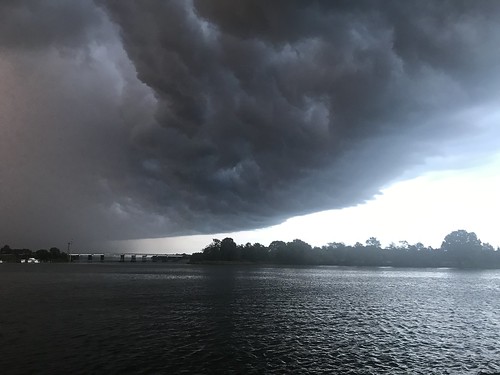Know Before You Go: Boaters Should Always Check the Weather
An Eye to the Skies Can Avoid Disaster

Photo by Lisa Creamer, submitted to the 2019 Maryland DNR Annual Photo Contest
Boating in Maryland is an enjoyable and exciting experience, but it can quickly turn into disappointment or even disaster for boaters who fail to check the weather before departing shore.
Every summer, the Maryland Natural Resources Police responds to multiple boating accidents due to rough waves and inclement weather. During the season, the weather can change in an instant — which makes it essential that all boaters check the weather before leaving shore and remain watchful for ominous weather signs.
Boaters out on the water should head for shore without delay at the first sign of threatening weather approaching. A good tip for keeping a watchful eye on severe weather is to look west, the direction from which most poor weather arrives. A common trick to determine the distance you are from an approaching thunderstorm is by counting the number of seconds between a flash of lightning and the clap of thunder. Dividing the number of seconds by five yields roughly the storm’s distance in miles.
If a storm can’t be avoided while on the water, boaters must ensure everyone aboard is wearing a life jacket in case the boat overturns. If lightning is frequent, passengers should stay below deck and avoid objects that are not grounded to the vessel. Taking a few minutes to check the weather before departing and while boating is essential, even life-saving in some cases.
Here are more tips to ensure a safe, fun-filled boating experience:
- Leave a float plan — let a loved one know where you are going and when you will be back.
- Make sure there is one U.S. Coast Guard-approved, wearable life jacket per person and extras, if needed.
- Attach a whistle to each life jacket.
- Have a working horn on board.
- Carry at least one fire extinguisher, per Coast Guard rules, and make sure it is readily accessible.
- Make sure flares aren’t expired.
- Have all required navigation lights on the vessel.
- Bring along a flashlight and spare batteries.
- Carry a toolbox with tools appropriate for your boat.
- Have a first-aid kit appropriately fitted for your type of boating.
- Top off fuel tanks and check the engine oil and coolant levels.
- Have a radio on board to receive weather updates and direct communications with other boats and the Coast Guard.
- Visually inspect lines for chaff or wear, and replace them as necessary.
While it may seem like a lot to remember, making this checklist part of a routine will help assure boater safety. A checklist is available on the Maryland Department of Natural Resources website.
Remember to know before you go!
